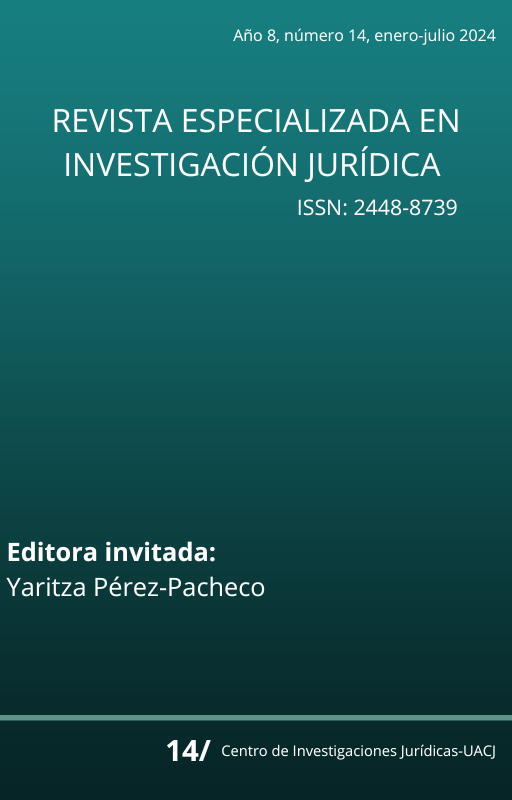The Digital Commercial Society and the e-Lex Mercatoria
DOI:
https://doi.org/10.20983/reij.2024.1.5Keywords:
lex mercatoria, digital economy, e-commerce, private international law, value chainsAbstract
Markets, as informational dynamic systems, are not static and,
certainly, they do not exist in isolation. They evolve addressing the
endogenous needs found within the economies in which they are
found. However, these needs are not homogeneous and they will
be a constant source of controversies that, if they are not addressed
appropriately, can put in danger the healthy dynamics of their
respective markets. To face this risk, we have relied on a set of norms
that have been complemented with consuetudinary elements,
which have fostered the development of a Commercial Society.
On this concept, which emerged from the pens of authors, such as
Adam Smith and David Hume, it has been argued that our markets
are dynamic systems that depend on the dynamism of their rules of
transition. For the specific case of the Digital Commercial Society,
the transitional element can be related to the denominated e-lex
mercatoria, which can be associated with the mechanisms developed
within the market to address, on an immediate basis, the users’
needs. Accordingly, this paper aims to foster the thought and the
discussion on the efforts of self-structuration and self-regulation
that configure those schemes that complement our legal frameworks
in force.
Downloads
References
Abedi, F., Zeleznikow, J., & Brien, C. (2019). Developing regulatory standards for the concept of security in online dispute resolution systems. Computer Law & Security Review, 35, 1-8.
Angeles, J. (2014). Fundamentals of robotic mechanical systems: Theory, methods, and algorithms. Springer.
Arrow, K. J., & Debreu, G. (1954). Existence of an equilibrium for a competitive economy. Econometrica, 22, 265-290.
Baker, J. H. (1979). The law merchant and the common law before 1700. Cambridge Law Journal, 38, 295-322.
Berry, C. J. (2015). The idea of commercial society in the Scottish Enlightenment. Edinburgh University Press.
Buchanan, G. (1750). De Jure Regni apud Scotos Dialogus. Ronerti Urie.
Chung, A., & Yu, Y. (2021). Consumer trust in the digital economy: The case for online dispute resolution. UNCTAD Research Papers, 15, 1-36.
Cox, R. W., & Wartembe, M. (2018). The politics of global value chains. En R. Kiggins (Ed.), The political economy of robots: Prospects for prosperity and peace in the automated 21st century (pp. 17-40). Palgrave Macmillan.
Goode, R. (2016). Goode on commercial law. Penguin Books.
Harcourt, A., Christou, G., & Simpson, S. (2020). Global standard-setting in Internet governance. Oxford University Press.
Heertje, A. (1988). Technical and financial innovation. En A. Heertje (Ed.), Innovation, technology, and finance (pp. 1-13). Basil Blackwell.
Hohfeld, W. (1914). Some fundamental legal conceptions as applied in judicial reasoning. Yale Law Journal, 16, 16-59.
Hume, D. (1997). Of commerce. In A. Broadie (Ed.), The Scottish Enlightenment: An anthology (pp. 387-397). Canongate Books.
Kohl, U. (2007). Jurisdiction and the Internet: Regulatory competence over online activity. Cambridge University Press.
Malinowski, B. (1966). Argonauts of the Western Pacific: An account of native enterprise and adventure in the archipelagos of Melanesian New Guinea. Routledge & Kegan Paul.
Mann, F. A. (1987). The proper law in the conflict of laws. The International and Comparative Law Quarterly, 36, 437-453.
Marrella, F., & Yoo, C. S. (2007). Is open source software the new Lex Mercatoria. Virginia Journal of International Law, 47, 808-837.
Mayer-Schönberger, V., & Ramge, T. (2018). Reinventing capitalism in the age of big data. John Murray.
Norman, J. (2018). Adam Smith: What he thought, and why it matters. Allen Lane.
Noto La Diega, G. (2023). Internet of Things and the law: Legal strategies for consumer-centric smart technologies. Routledge.
Noto La Diega, G., & Walden, I. (2016). Contracting for the ‘Internet of Things’: Looking into the Nest. European Journal of Law and Technology, 7, 1-21.
Organization for Economic Cooperation and Development. (2007). Participative web: User-created content. https://www.oecd.org/sti/38393115.pdf
Pasquale, F. (2015). The Black Box Society. The Secret Algorithms that Control Money and Information. Massachusetts: Harvard University Press.
Pistor, K. (2013). A legal theory of finance. Journal of Comparative Economics, 41, 315-330.
Smith, A. (1982). Lectures on jurisprudence. Liberty Fund.
Smith, A. (1997). The origin and development of our property rights. In A. Broadie (Ed.), The Scottish Enlightenment: An anthology (pp.478-487). Canongate Books.
Smith, M. E. (2004). The archaeology of ancient state economies. Annual Review of Anthropology, 33, 73-102.
Suzor, N. P. (2019). Lawless: The secret rules that govern our digital lives. Cambridge University Press.
Trakman, L. E. (2003). From the medieval law merchant to E-merchant law. The Universityof Toronto Law Journal, 53, 265-304.
Casos
Bertrand v. Ott. (1978). ECR, 150/77 (EU). https://eur-lex.europa.eu/legal-content/EN/TXT/?uri=CELEX%3A61977CJ0150
Evelina Kamenova v Okrazhna prokuratura-Varna [2018] C-105/17 (UE). https://curia.europa.eu/juris/liste.jsf?num=C-105/17
Hilton v Guyot [1895] 159 U.S. 113 (US). https://supreme.justia.com/cases/federal/us/159/113/
Jacobsen v Katzer [2008] 535 F.3d 1373 (US). https://casetext.com/case/jacobsen-v-katzer
Instrumentos Normativos
Digital Millennium Copyright Act (DMCA), https://www.copyright.gov/legislation/dmca.pdf
Ley Federal del Derecho de Autor. Diario Oficial de la Federación el 24 de diciembre de 1996. Última reforma publicada DOF 01-07-2020. https://www.diputados.gob.mx/LeyesBiblio/pdf/LFDA.pdf
OECD (2000). Guidelines for Consumer Protection in the Context of Electronic Commerce. https://www.oecd-ilibrary.org/docserver/9789264081109-en-fr.pdf?expires=1713487837&id=id&accname=guest&checksum=33DB4CD42D7C2F836F6CF-26DA53C366D
OECD (2024). Recommendations on Consumer Dispute Resolution and Redress. https://legalinstruments.oecd.org/public/doc/185/185.en.pdf
Tratado entre México, Estados Unidos y Canadá (T-MEC), https://www.gob.mx/t-mec/acciones-y-programas/textos-finales-del-tratado-entre-mexico-estados-unidos-y-canada-t-mec-202730?state=published
UNICTRAL (1996). Ley Modelo sobre Comercio Electrónico. https://uncitral.un.org/sites/uncitral.un.org/files/media-documents/uncitral/es/05-89453_s_ebook.pdf
Downloads
Published
Issue
Section
License
Copyright (c) 2024 Israel Cedillo Lazcano

This work is licensed under a Creative Commons Attribution-NonCommercial-ShareAlike 4.0 International License.
El titular de los derechos de explotación de los contenidos de la Revista Especializada en Investigación Jurídica es el Autor o Autora
El licenciamiento bajo el cual se publican los contenidos es Atribución-NoComercial-CompartirIgual 4.0 Internacional (CC BY-NC-SA 4.0) por lo que se autoriza compartir, copiar y redistribuir el material en cualquier medio y formato, adaptar, remezclar, transformar y construir a partir del material para cualquier propósito, siempre y cuando no sea con fines comerciales y se cite al autor(es) original y a la fuente, proporcione la liga a la licencia Creative Commons e indique claramente si se hicieron cambios a la obra y especifique cuales fueron dichos cambios. Para más información consultar el apartado de Política de Acceso Abierto de la revista.

















